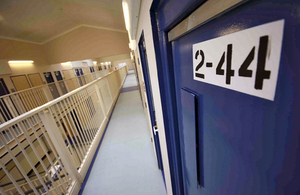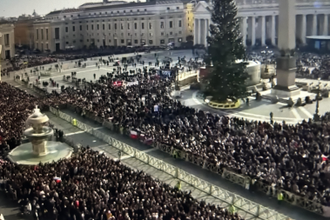Viewpoint: The prisons we deserve

image CCN
Prisons Week takes place from 10 -16 October this year. Fr Gerry McFlynn, from the London Irish Chaplaincy writes:
"Keep in mind those who are in prison, as though you were in prison with them" (Hebrews, 13:3)
Prisons are sacred places. There, our society claims control over the lives of men and women; there, we assume the role of God. And whether the prison is a huge one covering acres of ground, or compresses inmates on high landings, the air within holds a particular density, a palpable weight created not only by the crimes the prisoners have committed, but also by the ownership we have taken of them, whether we acknowledge it or not.
The great Russian writer Fyodor Dostoevsky in his novel Crime and Punishment wrote: "The degree of civilisation in a society can be judged by entering its prisons."
Prisons are, in a real sense, anti-social. They take the people who do not fit well into responsible society and make them even less fit to do so. That's why any worthwhile reform programme should concentrate on reminding the prisoner that he or she remains a citizen, a son or daughter, a partner, and equip them to make a better job of these relationships.
However, too many people still think about criminal justice in ways that reinforce the human drive to punish and to heighten their own sense of moral superiority. Sadly, this approach has deep roots in the Christian tradition. Just think of the theological orthodoxies that separate 'us' from 'them', 'saint' from 'sinner', 'damned' from 'blessed' and 'criminal' from 'innocent'.
The problem with such a bi-polar division is that it fails to account for the radical interconnectedness of all creation, including those deemed 'criminal' among us. Then there is the Old Testament symbol of the scapegoat, the one who is exiled bearing the guilt of the community. The 'bad theology' implicit in this practice has a long history and, sadly, continues to this day in one form or another.
However, while the idea of prison as a place of exile may be convenient, it is no longer morally acceptable. If society takes upon itself the right to punish people by depriving them of their liberty, it must also accept the obligation to welcome them back when they have paid their debt. This means that we have to accept that prison is an integral part of the community which has an obligation to prepare both the prisoner and itself for that return.
The Christian community should surely be at the forefront of attempts to turn prisons from places of punishment into places of redemption. In light of this, then, what are we to take from what one might call a theology of suffering presence? How should people of faith, hope and love deal with the 'criminals' among us?
It goes without saying that living out a Christlike 'suffering presence' with prisoners when they have committed violent crimes is difficult. Think of some testimonies like the the mother who can't sleep, tormented by wondering if her slain daughter's last cry was "Mum"; the jogger who can't forget the crack of her nose bleeding just before her rapist beat her to unconsciousness; or the prisoner who died in custody without disclosing the burial place of his victim, thereby ensuring lasting torment for the victim's family.
Anyone contemplating the Christian values of penance, forgiveness and reconciliation, must face head-on the memory of such acts. In short, we must embody the difference that Jesus' theology makes in the service of humanity's intimate social connectedness. Furthermore, this theological difference should then lead us to oppose, politically, the grotesque divisions produced and maintained by the modern day prison complex that routinely deals in the currency of lost human connections.
It has been said that prisoners are the last acceptable prejudice in society. They are certainly among its most marginalised and often despised people. I'll conclude with a quotation from the great theologian, Karl Rahner SJ, which I often reflect on: "When you go from your surroundings into a prison, you do not go out of a world of harmony, light and order into a world of guilt and unfreedom; you stay where you have been all the time. It is merely made clear to your bodily sense what has been surrounding you all the time". (The Prison Pastorate in Mission and Grace, Sheed and Ward, 1966).
LINK
London Irish Centre - https://londonirishcentre.org/


















